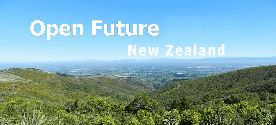
Open Future New Zealand
Video- Resources on Overshoot
Part 1 of 3 // Why Degrowth?
William Rees (36 minutes)
Published by: Vancouver Degrowth - 18 April 2014
 Video URL: https://youtu.be/zJQdVCwOZ1Y
Video URL: https://youtu.be/zJQdVCwOZ1Y
William Rees is a human ecologist, ecological economist, Professor Emeritus and former Director of the University of British Columbia's School of Community and Regional Planning in Vancouver, Canada, where his research and teaching focused on the biophysical prerequisites for sustainability in an era of accelerating ecological change. Dr. Rees is co-originator of ecological footprint analysis & winner of the 2012 Blue Planet Prize and the 2012 Kenneth E. Boulding award jointly with his former doctoral student, Dr. Mathis Wackernagel
Part 2 of 3 // Why Degrowth?
Jennie Moore (18 minutes)
Published by: Vancouver Degrowth - 18 April 2014
 Video URL: https://youtu.be/7iZQvmO_Fio
Video URL: https://youtu.be/7iZQvmO_Fio
Jennie Moore is Director, Sustainable Development and Environmental Stewardship at the British Columbia Institute of Technology. She has extensive experience in ecological sustainability and urban systems including climate change and energy management, green buildings and eco-industrial networking. Prior to joining BCIT, she worked at Metro Vancouver as Manager of Strategic Initiatives where she inspired the Sustainable Region. Jennie is a Leadership in Energy and Environmental Design Accredited Professional and has a PhD in Planning from the University of British Columbia's School of Community and Regional Planning.
Part 3 of 3 // Why Degrowth? Q and A
William Rees and Jennie Moore (25 minutes)
Published by: Vancouver Degrowth - 18 April 2014
 Video URL: https://youtu.be/owhuUJjZ7s0
Video URL: https://youtu.be/owhuUJjZ7s0
While most political and media dialogue on the health of our society focuses on how to stimulate and distribute the benefits of an ever larger economy, there's increasing reasons to think the structure of the 20th century economy may have been an historical anomaly. What is the scientific evidence as to why our economy won't continue to grow like it used to? How can we get past greenwashing to make a liveable transition towards life after growth?
Collapse in a Nutshell: Understanding Our Predicament
Michael Dowd (33 minutes)
Published by: The Great Story - 16 November 2021
 Video URL: https://youtu.be/lPMPINPcrdk
Video URL: https://youtu.be/lPMPINPcrdk
This is part one of a two-part primer on the nature, inevitability, and speed of biospheric and civilizational collapse.
Public Comment: "Great video! Thank you for compiling all your research and presenting this so clearly and genuinely. I woke up to this in the 80’s, moved to a rural location as close to a clean water source as possible, and strive to live every day with love in my heart for my family and others. Overshoot is so obvious and many of the people in power being clueless. Like a terminal cancer patient being bombarded with radiation, will this enhance the quality of our last years? Better to eat healthily, slow down, consume less, get your affairs in order, hold your dear ones close. And my dear ones include trees, plants and animals."
Overshoot in a Nutshell: Understanding Our Predicament
Michael Dowd (31 minutes)
Published by: The Great Story - 16 November 2021
 Video URL: https://youtu.be/lPMPINPcrdk
Video URL: https://youtu.be/lPMPINPcrdk
This is part two of a two-part primer on the nature, inevitability, and speed of biospheric and civilizational collapse. Part one, "Collapse In a Nutshell" can be found above: It is nearly impossible to truly understand (i.e., to get your head and heart around) our current local and global-scale challenges without this understanding. To join with others (in the "post-doom, no gloom" community) to share best practices and strategies for how to cope and adapt to this knowledge, see here: https://postdoom.com/discussions/
DOWN to EARTH
A Journey in search of the Earth Keepers.
(91 minutes)
Published by: Down to Earth Film - 23 December 2020
 Video URL: https://youtu.be/RoWgEOxoQy4
Video URL: https://youtu.be/RoWgEOxoQy4
Leaving behind their cosmopolitan life, a couple and their three young children embark on the journey of a lifetime. They travel the ends of the earth searching for a new perspective on life. In their five-year journey across six continents, they live with some of the oldest indigenous communities on the planet. They gain access to tribal sages never filmed or interviewed before, without a crew or schedule, just one backpack and one camera each. And the curiosity to listen.
They meet the most humble yet charismatic people; unknown individuals who live under the radar of our modern society in connection with the natural world. The film reveals the deep wisdom the family discover in their conversations with these 'Earth Keepers' and its power to transform lives. Having lived in hiding for centuries, the Earth Keepers see that now is the time to step forward and share their insights with those who are ready to listen.
http://www.downtoearthfilm.com
Global Tipping Points for Planet Earth
Dr. Anthony Barnosky and Dr. Elizabeth Hadly (95 minutes)
Published by:Balsillie School of International Affairs - 28 Novemer 2017
 Video URL: https://youtu.be/znTe9FawcoM
Video URL: https://youtu.be/znTe9FawcoM
The BSIA hosted renowned biologists Dr. Anthony Barnosky and Dr. Elizabeth Hadly on November 11, 2016. The authors of "Tipping Point for Planet Earth: How Close Are We to the Edge?" discuss how we know that planetary tipping points happen, why we seem on the brink of one, and what each of us can do to help the world tip in a direction that is good for people and the planet, rather than one that will harm both.
Tipping Points for Sustainability Transitions
Moderator: Oliver Morton (121 minutes)
Published by:Potsdam Institute for Climate Impact Research - 1 April, 2021
 Video URL: https://youtu.be/AAGQHPbsvTY
Video URL: https://youtu.be/AAGQHPbsvTY
Ecosystems are being destabilized by climate change and are at risk of reaching irreversible tipping points. Which way will things tip? How to manage tipping points as opportunities? Tipping points experts discuss these and other urgent questions in this Webinar (30 March 2021). With Hans Joachim Schellnhuber (PIK), Tim Lenton (Uni. Exeter), Cameron Hepburn (Uni. Oxford), Ilona M. Otto (Uni. Graz), Jonathan Donges (PIK), Manjana Milkoreit (Uni Oslo), Peter Bakker (WBCSD). Moderator: Oliver Morton (the Economist).